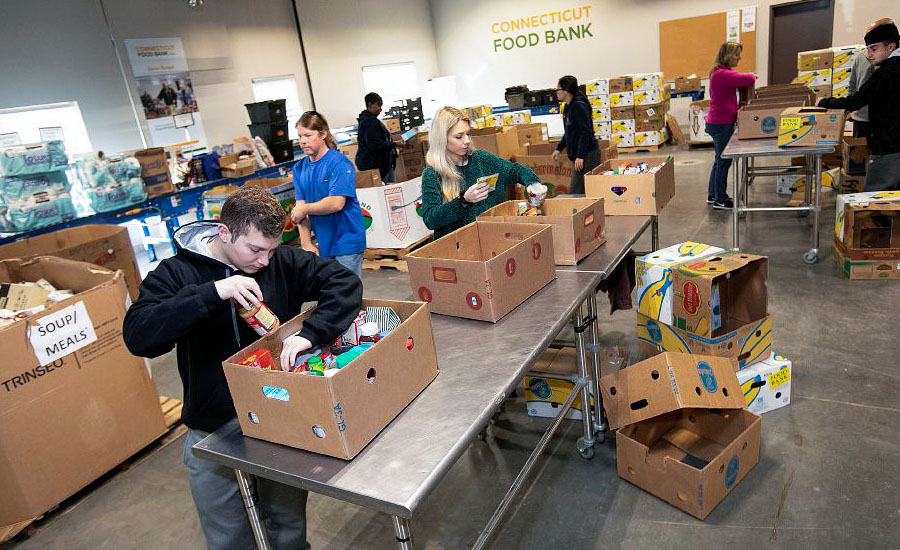
Staff and Volunteers of CT Food Bank distribute food. Photo Courtesy of Connecticut Food Bank
As unemployment rates skyrocket across the nation, more and more families are left worried about their next meals. Consequently, food banks are struggling to meet the demand that follows, with some being forced to turn away hungry families in need. To combat the rising food-insecure population, hunger-relief organizations such as Foodshare and Master’s Manna have been expanding their operations to increase their contribution to the community.
Foodshare, the largest anti-hunger organization in the Greater Hartford area, provides food for more than 280 food pantries, meal programs, and Mobile Foodshare sites. Continuing to operate in most of its sites, Foodshare has also opened up new pop-up distribution locations to try to meet the surging demand for food assistance. In April alone, it has seen a 31% increase in food distribution compared to the same time last year.
The new pop-ups span several sites throughout Hartford and Tolland counties, including a drive-through location at Rentschler Field in East Hartford. “We did 2,512 cars today. That’s 2,512 households that needed food. That’s a record for us,” said President and CEO of Foodshare Mr. Jason Jakubowski in a Facebook Live with Connecticut Senator Chris Murphy. “More than 75% of them [have] never used one of our services before. These are people who are brand new to food insecurity.”
Measures have also been implemented to ensure the safety of staff, volunteers, and those who are receiving the food. The office staff has been working from home, and workers at food sites are also abiding by new safety policies to maintain social distancing. Workers at distribution sites are given masks and gloves to wear at all times and are almost always 6 feet apart from one another. At the drive-through site especially, families are able to receive food through minimal contact with the staff and other families. “Some of our biggest challenges have been balancing how we meet the need while also maintaining a safe environment for our staff and the people we serve,” said Mr. Jakubowski.
Outside of direct food supply, Foodshare is also providing additional programs to aid the community during this time. By maintaining the SNAP Outreach Program, the organization continues to support low-income families trying to apply for the state’s Supplemental Nutrition Assistance Program (SNAP). Furthermore, the non-profit’s partnerships with local homeless shelters and soup kitchens have expanded to include donations of face masks.
Master’s Manna, a food pantry serving the Wallingford and Meriden areas, has also implemented similar measures as it distributes food to more than a hundred families each week.
“We closed our family dining area where we used to serve hot meals [and] our marketplace because, in those two areas, there was no way we could guarantee any social distancing,” said the Administrative Services Director Ms. Gail Powell.
Other operations at the food pantry have also been modified to ensure safety. Before the pandemic, people who came to the pantry shopped independently for their groceries. Now, the organization gives out prepackaged bags with enough food items for around twelve meals. To prevent crowding, the pantry implemented an appointment-based food distribution system. At the scheduled time, the prepackaged items are picked up at the curb and customers are given the opportunity to schedule an appointment for the following week. Communal items, such as the cart used to pick out goods, are also sanitized after each use.
Master’s Manna also conducts grocery deliveries each Friday to around 40 house-bound families in Wallingford.
“Some of our older clients are afraid to come out, so they are not coming out to the food pantry,” said Ms. Powell. This service is also available to those who are under quarantine or recovering from surgery or illness. “There are a variety of reasons why they are at home and unable to shop, but we will deliver their groceries to them as long as the need exists.”
The closing of businesses that were previously food donors has also contributed to the shortage of supplies for both of these organizations. “We source our food from several different supply chains and organizations, [but] the balance of where our inventory is sourced has shifted since the start of the crisis,” said Mr. Jakubowski.
Ms. Powell said, “Some of our corporate donations have slowed down because companies are not operating. They are not getting their regular revenue.”
But, other nonprofit organizations, as well as individual members of the community, have stepped up and contributed monetary donations towards helping these organizations replenish their supply.
“Our economic support comes from [an] extremely generous community, individual and corporate donors, as well as federal support in the form of TEFAP [The Emergency Food Assistance Program] funding, a federal commodity food program,” said Mr. Jakubowski.
Despite the many challenges, local food banks are devoted to supporting all citizens in need of meal assistance during this time. Ms. Powell said, “We plan to continue as long as the need exists, and we would like to see the need satisfied, but until it is, we will be here trying to do the best we can to make sure people don’t go hungry.”




